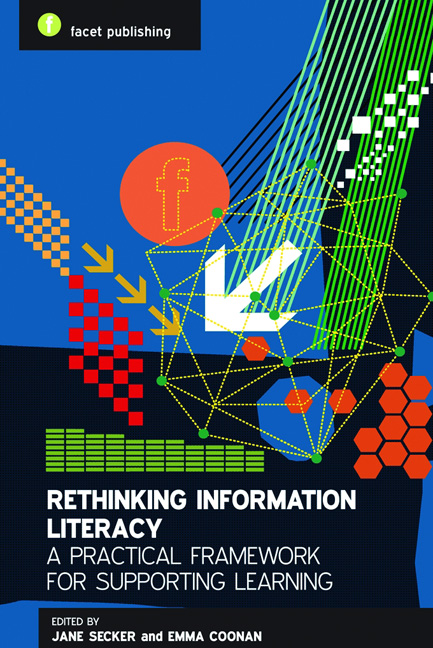Book contents
- Frontmatter
- Contents
- Acknowledgements
- Contributor profiles
- Introduction
- Strand One Transition from school to higher education
- Strand Two Becoming an independent learner
- Strand Three Developing academic literacies
- Strand Four Mapping and evaluating the information landscape
- Strand Five Resource discovery in your discipline
- Strand Six Managing information
- Strand Seven The ethical dimension of information
- Strand Eight Presenting and communicating knowledge
- Strand Nine Synthesizing information and creating new knowledge
- Strand Ten The social dimension of information
- Afterword: ‘Ownership is a flawed concept’
- Conclusion
- Appendix 1 A New Curriculum for Information Literacy (ANCIL): the curriculum
- Appendix 2 ANCIL Lesson Plan
- Appendix 3 ANCIL Institutional Audit: worksheet
- Appendix 4 ANCIL Institutional Audit: interview questions
- Index
- Miscellaneous Endmatter
- Miscellaneous Endmatter
- Miscellaneous Endmatter
- Miscellaneous Endmatter
Strand Eight - Presenting and communicating knowledge
Published online by Cambridge University Press: 08 June 2018
- Frontmatter
- Contents
- Acknowledgements
- Contributor profiles
- Introduction
- Strand One Transition from school to higher education
- Strand Two Becoming an independent learner
- Strand Three Developing academic literacies
- Strand Four Mapping and evaluating the information landscape
- Strand Five Resource discovery in your discipline
- Strand Six Managing information
- Strand Seven The ethical dimension of information
- Strand Eight Presenting and communicating knowledge
- Strand Nine Synthesizing information and creating new knowledge
- Strand Ten The social dimension of information
- Afterword: ‘Ownership is a flawed concept’
- Conclusion
- Appendix 1 A New Curriculum for Information Literacy (ANCIL): the curriculum
- Appendix 2 ANCIL Lesson Plan
- Appendix 3 ANCIL Institutional Audit: worksheet
- Appendix 4 ANCIL Institutional Audit: interview questions
- Index
- Miscellaneous Endmatter
- Miscellaneous Endmatter
- Miscellaneous Endmatter
- Miscellaneous Endmatter
Summary
Strand Eight covers all aspects of presenting and communicating knowledge – one of the less traditional aspects of information literacy, but also probably one of the most important in terms of a transferable and life skill. This strand includes finding your voice, learning to use language appropriately in academic and other types of writing, and using evidence to justify a position. In a digital environment how you present yourself and manage your online identity is an increasingly important facet of information literacy. This includes an awareness of how you appear to others online, deciding on an appropriate level of information to communicate with different audiences, managing your ‘digital footprint’ and evaluating the suitability of different locations and tools for presenting your online presence. The strand also includes an understanding of how to communicate appropriately, choosing appropriate writing styles and formats for a specific audience, as well as understanding the methods of publishing research in your discipline and the relationship between writing style, audience and publication platform.
Andy was another member of the expert group consulted during the ANCIL research to provide input into both how to teach the curriculum and what to include in it. Strand Eight of the curriculum focuses on how to present and communicate knowledge in the broadest sense, and in many institutions teaching these skills has fallen outside the responsibility of librarians. However, the two examples of teaching sessions from Judge Business School show how librarians are often pioneering and leading the way in terms of being advocates of social media. Andy's approach also highlights the subtle but important shift from teacher to facilitator of learning, and the importance of allowing students to be active in the learning process.
Institutional context
Judge Business School is a leading provider of innovative and practical business and management education to executives, graduates and undergraduates. It is a fully integrated department of the University of Cambridge and boasts a world-class faculty of 50 members, many of whom are leaders in their field. In 2011 it was ranked second in the UK and seventh globally for one-year MBA programmes by the Financial Times. Our flagship MBA and Masters in Finance programmes have course fees of £36–38,000 per annum.
Information
- Type
- Chapter
- Information
- Rethinking Information LiteracyA practical framework for supporting learning, pp. 95 - 106Publisher: FacetPrint publication year: 2012
